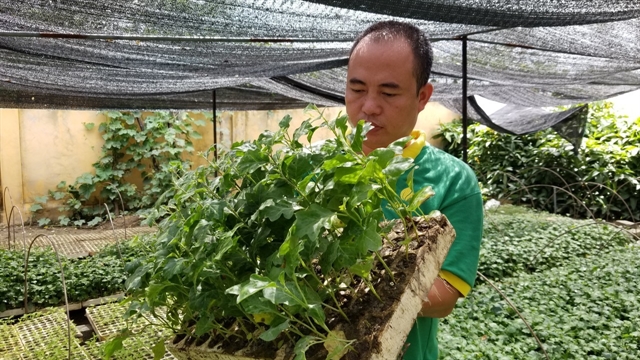 Society
Society

Phan Trung Kiên, an agricultural engineer in a small village in the Hà Nội suburbs, has always known that his local herb cà gai leo was more than just a regular wild plant.

|
| Phan Trung Kiên, an agricultural engineer in Hà Nội's Đoàn Kết Village in Chương Mỹ District checks the cà gai leo varieties at his cultivation area. VNA/VNS Photo |
HÀ NỘI – Phan Trung Kiên, an agricultural engineer in a small village in the Hà Nội suburbs, has always known that his local herb cà gai leo was more than just a regular wild plant.
The special plant, especially the fruit, can bring health benefits to those who take it regularly. His mother would often brew the plant into a medicinal drink when he was younger.
“I remember many times my mother boiled the plant and urged me to drink it as a way of keeping me healthy when I was small," he said. "She also made it whenever I got drunk. That’s her way to help me get rid of a hangover and ease liver damage caused by excessive alcohol consumption.”
Born into a farming family in Đoàn Kết Village in Chương Mỹ District, Kiên has always had a keen interest in local agricultural produce.
After graduating from Vietnam National University of Agriculture, Kiên conducted research into cà gai leo (Solanum procumbens) and was glad to know it was recognised as a herbal medicine.
“It’s a a valuable herbal plant that has positive effects on stabilising liver cells and enhancing liver function,” he said.
Research by the National Institute of Medical Substances shows that Haima, a medicinal product extracted from the plant, can help cure hepatitis B.
Kiên and his friends decided to establish a cultivation area for the herbal plant in Miếu Môn Commune in 2015.
“The plant often grew in the wild, and local people picked it to use as a herbal medicine. We decided to grow it as raw material for pharmaceutical businesses,” he said.
Shortly after he started growing herbal plants, Kiên had the same problem as many farmers in his hometown. The price of the plant quickly decreased from VNĐ150,000 per kilogram to VNĐ35,000 per kilogram after he expanded the growing area to 20ha.
Kiên knew that he would never get the best price when he only sold the raw material, so took a bold decision to make the final product himself.
Kiên dried the plant and packed it to make tea and sold it to his customers. He also labelled the branches and made tea bags to give customers more choice. He even learnt how to market the product online to expand his customer base.
Things went well. In 2016, Kiên established Thăng Long Hi-tech Agriculture Joint Stock Company to facilitate production expansion and shape new products.
His products were registered at the National Office of Intellectual Property under the new name Sadu, which signifies organic and medicinal products.
Kiên said it was a long journey to make the tea brand well-known and win consumer hearts. He suffered losses and learnt many lessons along the way.
Overspending on a watering system caused much waste and his inexperience processing the plant made the product less tasty, but he learnt from his mistakes.
“Usually, the herbal plant can be harvested from the first crop in six months, and the next crop every four months. The income is four to five times higher than that of a rice crop,” he said.
Now Kiên has more than 100ha, bringing jobs for 75 workers with an income of between VNĐ5-15 million (US$219-657) per month.
He also built a closed model from planting and preliminarily processing, to processing raw materials and finished product. Each product has a barcode for easy traceability.
He also learnt new marketing strategies to be able to sell the products during the pandemic.
Introducing the products to big stores or supermarkets was no longer a good method, so Kiên promoted online sales and registered his products on e-commerce platforms such as OCOP (one-commune-one-product) model, which has been set up by the city to support businesses and cooperatives during the pandemic.
“I’m thinking of expanding the market of herbal plants in the future. Organic and healthy herbal plants will bring more choices for consumers and at the same time create jobs for people in my hometown,” he said. — VNS




